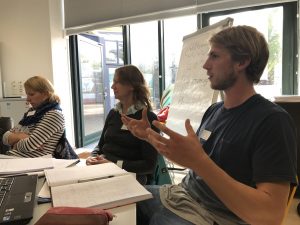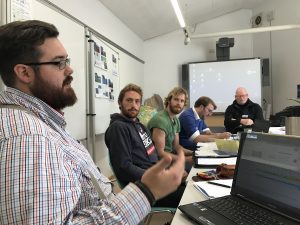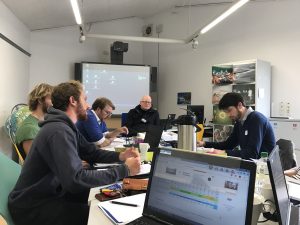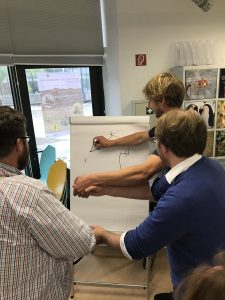
Thumb wrestling, “Offshore”, and other simulation games
“Ready? Set! Aaaaand go!” was the command given at the start of a thumb wrestling war. In every pair of workshop participants, thumbs were being twisted, squeezed, freed again. We were given only 30 seconds to win! And then the time was over. “Who got how many points? Anybody more than 10?”. Nope. Most people only had about three. Which, turns out, was because none of us had listened to the instructions given in the beginning: We had been told to play thumb wrestling, but with the instruction to make as many points as possible. NOT to win against the person we were playing with. So the best strategy would have been to just very quickly tap on the other person’s thumb, maybe taking turns, but definitely not to twist, wriggle, squeeze and waste time fighting! Ooooops.
This is how our very busy — but also very exciting — phase at the energie:labor continued. Yesterday, we hosted Klaus Masch, creator of the simulation game “Offshore” (all of the materials for this game are online here), who gave a workshop on the theory behind simulation games and how to implement them in teaching. And since we learn best by doing and then reflecting about it (the equation for this, we learned, is DExR=L, which I remember without looking at my notes, which are on my desk at work while I am home on my sofa. DE being Direct Experience, R reflection, and L learning. And since learning is the product of DE and R, both have to be bigger than zero for learning to occur… (Or, technically, unequal to zero and of the same sign, but maybe the both-negative case doesn’t apply here ;-)) See, it left quite an impression!), we got to play the simulation game ourselves.
Now. Everybody who knows me in person knows I HATE playing any kind of games. Hate it with a passion. But since I had read so much about the benefits of simulation games in teaching, I really wanted to try it in order to get a better idea on whether I should get over myself and offer one as part of energie:labor. And I have to say, I am a convert.

In Offshore, students discuss the possible investment of their city into an offshore wind park as reaction to the political decision to quit nuclear power all throughout Germany. They research and adopt the roles of different stakeholders (the mayor, the city council, an investment banking firm, the people building the wind park, scientists, environmental groups) and debate risks and benefits. For us, that meant starting research before lunch, already in our roles, staying in the roles over our lunch breaks (which included lots of negotiations and bilateral conversations already!), doing some more research after, and then, finally, debating in the official debate. I got to play a double role: A student at the Institute of Applied Marine Science who is also active in the environmental group Save the Ocean. In a way, that role was probably the easiest of all: I had clear instructions that I was definitely against the project, so I could just be against everything but didn’t have to offer alternatives. All other roles had more balanced roles: Of course the investment people wanted to make as much money as possible from the project, but the role of my boss, for example, a professor in Applied Marine Sciences, was instructed to consider marine protection, but there was still room to interpret that in different ways.
Since Offshore is a frame game, it is quite easily adapted to different situations. One of our participants, for example, could only join after lunch. So a new role, the journalist, was invented for him and he was included in our simulation right away.
Participants in the workshop were all related to the energie:labor or KiFo in some way: Either having previously worked there, or currently working there with student projects or Master theses, or a visiting friend from the University of Applied Sciences who is involved in running their own energy lab that we cooperate with. That was great for me: Now future discussions on whether and how to use a simulation game for the energie:labor can refer to this common experience of playing together for a day, and getting so many useful tips and tricks along the way!
There were also so many useful micro teaching things going on that we can pick and choose from in other contexts, too. Below, for example, you see three participants holding hands: The one drawing on the flip chart has his eyes closed, while both others have their eyes open. And the left person has to guide the pen — through the other two! This, of course, causes a time lag between a signal going out and resulting in something on the paper, which sometimes makes it difficult to navigate the pen. Which is a great simulation of any complex system with a time lagged response: Any action you take doesn’t have visible effects right away, so it’s easy to over-correct and cause a mess just by being to fast in responding on the changes you (don’t) see that were caused by previous actions.
To get back to the thumb-wrestling in the beginning: That micro simulation game is one I, or any of the other participants, for that matter, will never forget. It was a very bold and impressive reminder that collaboration should be the first impulse rather than assuming that every situation, every game is about playing against someone. Maybe that’s what won me over to playing?
This was a really useful workshop, and I highly recommend both the instructor and the game! Thank you all for participating and thanks to our wonderful instructor! :-)



Currently reading "the Climate Change Playbook" by Meadows et al. (2016) - Adventures in Oceanography and Teaching says:
[…] game intervention to show how we often default to competition instead of cooperation (haha, in a post from 2017 I write about how I experienced it in a workshop and that will never forget it, but clearly I did!). Ola Leifler then recommended “the Climate Change Playbook”, and […]